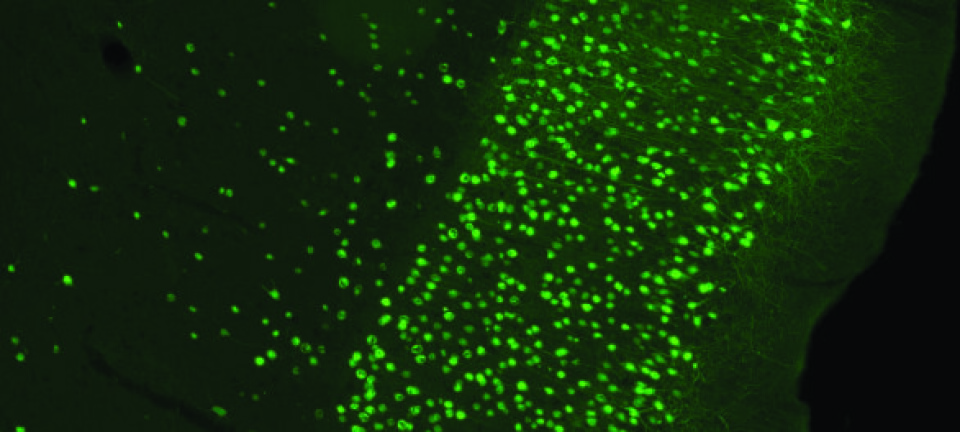
Parkinson’s spreads faster than we thought
The brain of a Parkinson’s patient is damaged at an early stage, even when the symptoms are mild, new study finds.
It can have serious consequences for the relationship when a spouse is diagnosed with Parkinson’s disease.
In addition to motor problems, many Parkinson’s patients also experience symptoms such as apathy and depression.
These symptoms are often treated with medicine. As a result of this treatment up to ten percent of Parkinson’s patients develop gambling addictions, difficulties in controlling their sex drive, excessive shopping, binge eating or hyperactive behaviour.
Now a group of Danish researchers has discovered some hitherto unknown brain changes in the early stages of Parkinson’s disease.
It is quite surprising to find that the reward system in the brain was almost entirely knocked out already at the point of diagnosis.
The findings, published in the journal BRAIN, may help patients avoid these side effects.
Dysfunctional reward system
The study shows that the disease affects the outer parts of the brain at a much earlier stage in the disease than previously thought.
“It didn’t take long for our scientific article to be accepted and published, because it is quite surprising to find that the reward system in the brain was almost entirely knocked out already at the point of diagnosis;” says Hartwig Siebner, a professor of neuroimaging at Copenhagen University.
He believes the new findings may pave the way for more accurate treatment in the early stages of the disease.
Dopamine makes us feel good and aids learning
This would make it easier to personalise the drug treatment. The brain scans will, for instance, help determine which patients have an increased risk of developing a gambling addiction and other adverse behavioural disorders during treatment.
In the study, a group of patients underwent fMRI brain scans while playing cards for money. The scans revealed that the reward system in the patients’ brains become paralysed in the early stages of the disease.
The reward system is the mechanism in the brain that triggers a joyful feeling in the shape of dopamine when we e.g. learn something new, eat a good meal, have sex, laugh or when we have exercised.
Parkinson’s disease is to a large extent the result of a lack of this neurotransmitter. Here, the dopamine neurons die before they can fulfil their function.
”Dopamine is a neurotransmitter that not only promotes the motoric learning process, but also the emotional and psychological learning processes. Patients with Parkinson’s lack this inner ‘drive’, and they do not have sufficient energy to think, which contributes to apathy,” says Siebner.
Winning did not trigger a reaction in Parkinson’s patients
If the reward system is highly dysfunctional in the early stages, it would perhaps be a good idea to be more careful when starting treatment with dopamine agonists.
The study consisted of 13 people who had been diagnosed with early-stage Parkinson’s. These patients had not yet received medical treatment for the disease.
Another 12 age-matched and healthy control subjects underwent the same tests.
The study was based on a basic card-based gambling task. While playing, the participants underwent brain scans, which enabled the researchers to see how their reward systems responded.
“We observed strong brain activity in the healthy control group when they won and a significant reduction in brain activity when they lost,” says the professor.
“The increase in brain activity corresponded to the amount they won or lost. This increase tells us something about how sensitive our reward system really is.”
In contrast to the healthy subjects, he explains, there was a much lower sensitivity in the brain’s ‘pleasure centres’ in relation to gains and losses in the Parkinson’s patients.
This is due to less dopamine being released in the centres where the brain creates the feeling of joy and happiness. The outcome of the bet also did not affect the release of dopamine in the parts of the brain that are responsible for learning.
Many brain areas affected
This study adds to the existing scientific understanding of Parkinson’s and backs up more recent findings, which suggest that Parkinson’s is a disease that affects many different parts of the brain.
Up to about a decade ago it was thought that Parkinson’s is caused by damage deep inside the brain in a region known as the substantia nigra – a black substance in the brain stem.
This is one of the regions where the brain produces dopamine, and the little black blob distributes dopamine to other parts of the brain. But in Parkinson’s patients many of the dopamine cells have died by the time they leave this part of the brain stem.
A new measure for Parkinson’s patients
Siebner believes that his experiment with card games is so simple that it can be used in standard examinations of Parkinson’s patients.
This, he says, would act as a kind of measure for how badly the patient’s reward system is affected in the various parts of the brain when they are diagnosed.
”This would make it easier to personalise the drug treatment. The brain scans will, for instance, help determine which patients have an increased risk of developing a gambling addiction and other adverse behavioural disorders during treatment,” he says.
”If the reward system is highly dysfunctional in the early stages, it would perhaps be a good idea to be more careful when starting treatment with dopamine agonists.”
The professor is, however, keen to point out that further studies are needed before it becomes practically possible for physicians to make such decisions.”
--------------------------
Read the Danish version of this article at videnskab.dk








